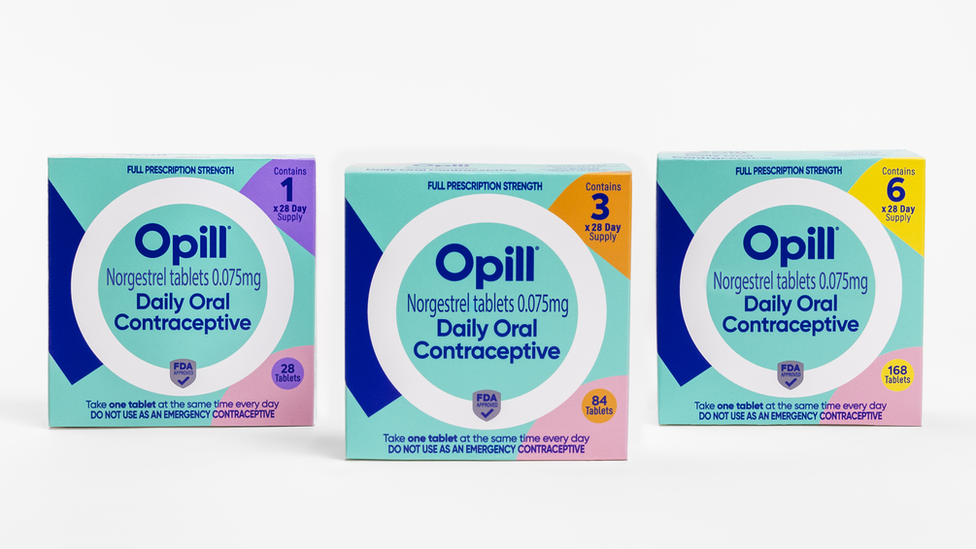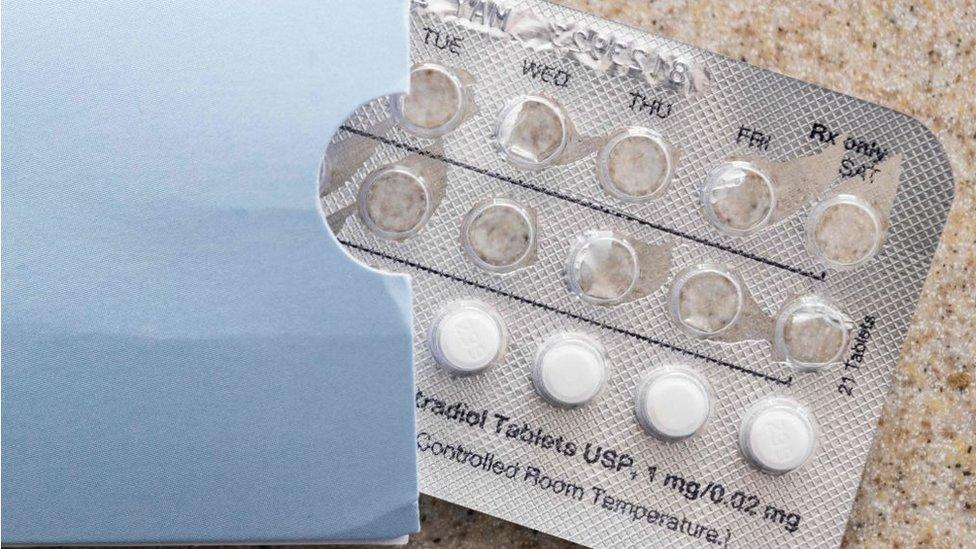First over-the-counter birth control pill shipped in US
- Published

The first-ever over-the-counter birth control pill is now being shipped to US pharmacies.
The Food and Drug Administration last year approved the birth control pill Opill to be available without a prescription for women of all ages.
The agency said the move would reduce barriers to accessing contraception.
Opill's manufacturer said on Monday that the pill would be available in stores and online in the coming weeks for $19.99 (£15.77).
Doctors say that the progestin-only pill - often known as the "minipill" - is a particularly safe form of contraception because it does not contain oestrogen, meaning it has fewer side effects and health risks.
The most common side effects of Opill include irregular bleeding, headaches, dizziness and nausea.
The US is joining more than 100 countries around the world that have made the birth control pill available over the counter, including most countries in Latin America, as well as India, China and the United Kingdom.
The approval comes after an FDA expert advisory panel last May unanimously voted to recommend the pill be available over the counter.
During the hearing, some scientists had raised concerns about whether young people and those with limited literacy could understand the directions, including not taking the prescription if they had a history of breast cancer.
But committee members concluded women with breast cancer were already likely to be in contact with their doctors and aware that they should not take hormonal contraception.
Ultimately, the panel found that Opill - first approved by the FDA in 1973 - had a history of safety and efficacy in preventing pregnancies.
Experts say women - and in particular, teenagers - encounter a number of barriers to accessing reproductive health services, including a lack of health insurance and difficulty finding transportation to doctor's appointments.
Women also sometimes face stigma and shame from health care providers and parents when trying to obtain the pill, experts added.
Dyvia Huitron is one of these people. She struggled for three years to access the birth control pill.
Growing up in a predominately Hispanic, religious community in the border town of McAllen, Texas, the 19-year-old first tried to get a prescription when she started having sex at age 16.
But her parents, who had her when they were teenagers, denied her the required permission because they worried the contraceptive would make her engage in more sexually risky behaviour.
Then, at age 18, Ms Huitron went to college in Alabama, where the age of adulthood is 19, meaning her parents would still be able to review her medical information, forcing her to wait one more year.
"Because I came from teen parents, that was one of my biggest fears," she told the BBC. "I wanted to do everything to prevent that same outcome … But I had to jump through so many hoops."
Doctors and activists have argued making birth control available without a prescription will have a host of health benefits for women and teenagers like Ms Huitron, including reducing unintended pregnancies.
In the US, some studies have found as many as nearly half of all pregnancies are unintended.
For the most part, the debate on whether to make contraception more readily available has not sparked the same controversy as the conversation around abortion access.
In statements to the BBC, several anti-abortion groups, including National Right to Life and Susan B Anthony Pro Life America, said they do not take a stance on birth control.
The FDA decision has been lauded by several medical and advocacy groups, including Advocates for Youth, a nonprofit organisation pushing for reproductive health rights, which called the approval "long overdue".
But some remain concerned about the price of the pill. In a statement, Free the Pill, a group pushing for expanded birth control access, celebrated the news it would be available soon, but said the price tag means it will "remain out of reach for many people working to make ends meet".
The group has pushed for the pill to be covered by insurance. While regulations in the US require a prescription to cover the cost of medications, patients may be able to receive partial or full reimbursement depending on their provider and plan, according to Opill's manufacturer.
Watch: Abortion pills explained in 60 seconds
Related topics
- Published12 July 2022

- Published10 May 2023
